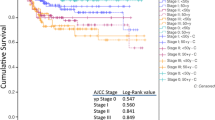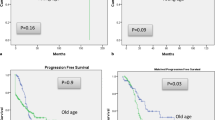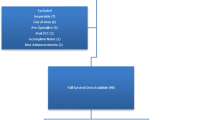Abstract
Background
The incidence of rectal cancer in young Indians is increasing. Recent evidence suggests a probable existence of noncanonical tumorigenesis pathways in early-onset colorectal cancer patients in India. The aim of the study was to evaluate rectal cancer outcomes in patients ≤40 years with those >40 years.
Methods
An analysis of a prospective database of surgically treated rectal cancer patients ≤40 years (group 1) and those >40 years (group 2) over 2 years was performed. Clinicopathological features, perioperative outcomes, and disease-free survival (DFS) were analyzed.
Results
Of the 512 patients with colorectal cancer treated surgically, 237 patients (group 1—57 patients; group 2—180 patients) were diagnosed with nonmetastatic rectal adenocarcinoma. Patients in group 1 were more likely to present with locally advanced (stage III) disease (p < 0.005) resulting in a higher proportion of them receiving neoadjuvant chemoradiotherapy (NACT-RT). There was no difference in morbidity and mortality between the two groups. Younger patients had a significantly higher median total and positive lymph node yield (p < 0.003). Patients in group 1 had a significantly lower overall DFS (p < 0.005). Stage-specific DFS also demonstrated a significantly lower trend in stage III patients in group 1.
Conclusions
Young rectal cancer patients in India tended to present more frequently with locally advanced tumors resulting in a higher proportion being treated with NACT-RT. Stapled rectal anastomoses could be performed safely in young patients even after NACT-RT. The significantly poorer DFS in young Indian patients with stage III disease was a novel finding and merits further investigation into tumor biology.


Similar content being viewed by others
References
Gupta S, Bhattacharya D, Acharya AN, Majumdar S, Ranjan P, Das S. Colorectal carcinoma in young adults: a retrospective study on Indian patients: 2000–2008. Colorectal Dis. 2010;12:e182–9.
Nath J, Wigley C, Keighley MR, Perakath B. Rectal cancer in young adults: a series of 102 patients at a tertiary care centre in India. Colorectal Dis. 2009;11:475–9.
Mohandas KM, Desai DC. Epidemiology of digestive tract cancers in India. V. Large and small bowel. Indian J Gastroenterol. 1999;18:118–21.
Siegel R, Jemal A, Ward E. Increase in incidence of colorectal cancer among young men and women in the United States. Cancer Epidemiol Biomarkers Prev. 2009;18:1695–8.
You YN, Dozois EJ, Boardman LA, Aakre J, Huebner M, Larson DW. Young-onset rectal cancer: presentation, pattern of care and long-term oncologic outcomes compared to a matched older-onset cohort. Ann Surg Oncol. 2011;18:2469–76.
Mukherji A, Rathi AK, Sharma K, Kumar V, Singh K, Bahadur AK. A study on presentation and behavior of colo-rectal carcinoma in young Indian patients. Trop Gastroenterol. 2011;32:122–7.
Cusack JC, Giacco GG, Cleary K, et al. Survival factors in 186 patients younger than 40 years old with colorectal adenocarcinoma. J Am Coll Surg. 1996;183:105–12.
Smith C, Butler JA. Colorectal cancer in patients younger than 40 years of age. Dis Colon Rectum. 1989;32:843–6.
Raman R, Kotapalli V, Adduri R, et al. Evidence for possible non-canonical pathway(s) driven early-onset colorectal cancer in India. Mol Carcinog. 2012. doi:10.1002/mc.21976.
Therasse P, Arbuck S, Eisenhauer E, et al. New guidelines to evaluate the response to treatment in solid tumors: European Organization for Research and Treatment of Cancer, National Cancer Institute of the United States, National Cancer Institute of Canada. J Natl Cancer Inst. 2000;92:205–16.
Shrikhande SV, Saoji RR, Barreto SG, et al. Outcomes of resection for rectal cancer in India: the impact of the double stapling technique. World J Surg Oncol. 2007;5:35.
Sobin L, Gospodarowicz M, Wittekind C, (eds). UICC: TNM Classification of Malignant Tumours. 7th ed. Wiley-Blackwell: Oxford; 2009.
Shrikhande S, Bodhankar Y, Suradkar K, Goel M, Shukla P. Perioperative outcomes after ultra low anterior resection in the era of neoadjuvant chemoradiotherapy. Indian J Gastroenterol. 2013;32:90–7.
Shetty G, Bodhankar Y, Ingle S, et al. Complications as indicators of quality assurance after 401 consecutive colorectal cancer resections: the importance of surgeon volumes in developing colorectal cancer units in India. World J Surg Oncol. 2012;10:15.
Wang L, Hollenbeak CS, Stewart DB. Node yield and node involvement in young colon cancer patients: is there a difference in cancer survival based on age? J Gastrointest Surg. 2010;14:1355–61.
Deodhar K, Budukh A, Ramadwar M, Bal M, Shrikhande S. Are we achieving the benchmark of retrieving 12 lymph nodes in colorectal carcinoma specimens? Experience from a tertiary referral center in India and review of literature. Indian J Pathol Microbiol. 2012;55:38–42.
Conflict of interest
None.
Author information
Authors and Affiliations
Corresponding author
Rights and permissions
About this article
Cite this article
Barreto, S.G., Chaubal, G.N., Talole, S. et al. Rectal cancer in young Indians—Are these cancers different compared to their older counterparts?. Indian J Gastroenterol 33, 146–150 (2014). https://doi.org/10.1007/s12664-013-0396-0
Received:
Accepted:
Published:
Issue Date:
DOI: https://doi.org/10.1007/s12664-013-0396-0




